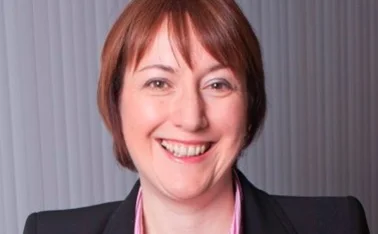
Broking success: Marshall the troops
Trident Insurance MD Robert Marshall on how searching for growth may mean shifting focus towards commercial lines and why he brought the broker’s compliance function back in-house. Caitlin Morrison reports
▶ How did you get into insurance broking?
By default. I was working for an investment bank called BZW and the parent company, Barclays, decided they were going to close it up.
It was not quite a mid-life crisis but I had to try and do something else. At 43 your merchandisable value is not as high as you might think it is, particularly in the City where, when one firm is letting people go, everybody’s closing up. I bought a claims management franchise but I didn’t like that at all. Then an opportunity came up here, and I thought ‘well it’s better to be earning money than drawing money’, so I came in as a partner. We changed the company to a limited company and have spent 15 years trying to get things right.
 ▶ Which lines do you operate in?
▶ Which lines do you operate in?
Personal lines was the key area previously but we’re trying to go slightly more into commercial lines and particularly fleet.
We’ve got an expertise that has had some pretty good success in generating interest from outside. We’ve looked at fleet and tested it – we’ve looked at where people are enthused and where they’re not. Mini-fleet insurance you can get anywhere, but with slightly more sizeable stuff it’s about knowing where to go. There are some really good insurers who supply a good service. It’s not something you can do on the internet. It requires a bit more thinking, a bit more proper valuing of the risk. You know the insurers are looking at the risk properly, they’re not just looking at the postcode.
▶ How do you go about finding new business?
Growing a small firm, just trying to grow full stop is not easy when you’re up against it. You have to keep on trying to reinvent the wheel when most people say there’s no reason to. We’ve tried different modes of advertising, we’re on Twitter and Facebook, which I know seems natural to most people but I don’t really understand why. Reputation through value comes in handy too, references from people who like what we do.
▶ Will you ever pull out of personal motor?
There is a certain amount of good fodder and old customers that you have to look after, but can you go chasing after new customers in the same vein? No, because they’ve all moved ahead of the curve in a way and they’ve decided that they’ll only go to a broker if there’s a major problem and they can’t go anywhere else.
You can flog a marketplace to the point where it’s really of no value, and with some of the car stuff people don’t see a difference between one firm and another. It’s just a case of what game or what gimmick they recognise, a guy with a twirly moustache
or a meerkat. Customers don’t see what is behind that. I think the internet has got a
lot to answer for around transparency,
which is brilliant on the one hand, but it’s edited transparency. People are completely price-focused now which is a worry
because you can’t seem to explain to them that they need to be sure of what they’ve really paid for.

▶ Have you noticed insurers making more sensible pricing decisions?
No. There is a finite amount of end customers and an infinite amount of supply and until there’s a correlation between the two that finds the right equilibrium, pricing is going to be absolutely key. When it comes to cars, companies are still prepared to put people on cover over and over when they really should be banned. Is the end customer actually giving all the information at the start of the process? The answer is customers all know that it pays to appear to have a blemish-free record and let somebody try to find out.
▶ What is your approach to making acquisitions?
I think that we’re still too leveraged in the personal lines area and working with a more commercially-led firm would be the perfect balance. That’s a problem insofar as personal lines is viewed as third or fourth-tier business and therefore sniffed at as being more trouble than it’s worth. We don’t want to be a particularly large firm, there’s more trouble the larger you grow and you have more issues with personnel. From working within the bank, which had over 7,000 employees, I know that you get many fiefdoms and control issues become very problematic. There’s an assumption in the capitalist world that big delivers – well we’ve seen that it does anything but. Big companies are more susceptible to doing the customers a great disservice. Big is undeniably not beautiful – big is just a shedload of problems.
 ▶ What is the biggest problem facing brokers?
▶ What is the biggest problem facing brokers?
I think the biggest problem is regulation. There is a serious issue in the fact that we have people who are trying to do a good job at the regulatory end but there seems to be no control over them. In every firm there has to be checks and balances but when you deal with the regulator it’s sort of a one-way ticket. Every part of the equation from the prosecution to the defence, nobody’s saying ‘are we actually getting good value for money’. I think there was a lot of rhetoric when Hector Sants left about how things were going to change and about how everybody’s listening more, but that’s not really making any difference. We can all listen, but if nobody’s prepared to change, or to act in a different manner, it makes it difficult, and expensive. We need a regulator who is not out to punish people, we need a regulator who’s there to support the market.
▶ How do you deal with the compliance side of the job then?
We did use a compliance firm but we’ve now moved to a different basis altogether. We’re looking at the rules ourselves, what the obligations are. We’re taking advice primarily in the Cass area, the systems and controls area, to make sure everything is done right. I once called the FSA about a particular issue and asked them why they don’t have an open day so people could come along and ask questions. They said it was too difficult to organise a meeting of 21,000 regulated people, it was easier for them to send out an email. But how can they make that email clear and cater to everyone? Sometimes picking up the phone and speaking to the regulator is the only way to go.
▶ Why did you move your compliance work back in-house?
I think some of the information we had before was not 100% right. What I find bizarre is that for small firms, that can’t employ a compliance individual as a full-time person, they have to second them in. And we found out that compliance individuals aren’t regulated themselves. So if I’m the compliance person being paid a monthly rate, and I don’t know the full or right answer, I’m telling you, the broker, whatever I perceive and you are the one who will be hit between the eyes. It’s a nonsensical situation. Quis custodiet ipsos custodes – who is guarding the guards?
Only users who have a paid subscription or are part of a corporate subscription are able to print or copy content.
To access these options, along with all other subscription benefits, please contact info@insuranceage.co.uk.
You are currently unable to print this content. Please contact info@insuranceage.co.uk to find out more.
You are currently unable to copy this content. Please contact info@insuranceage.co.uk to find out more.
Copyright Infopro Digital Limited. All rights reserved.
As outlined in our terms and conditions, https://www.infopro-digital.com/terms-and-conditions/subscriptions/ (point 2.4), printing is limited to a single copy.
If you would like to purchase additional rights please email info@insuranceage.co.uk
Copyright Infopro Digital Limited. All rights reserved.
You may share this content using our article tools. As outlined in our terms and conditions, https://www.infopro-digital.com/terms-and-conditions/subscriptions/ (clause 2.4), an Authorised User may only make one copy of the materials for their own personal use. You must also comply with the restrictions in clause 2.5.
If you would like to purchase additional rights please email info@insuranceage.co.uk







